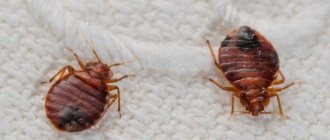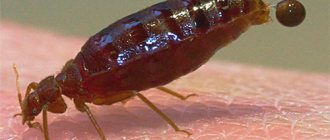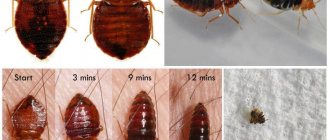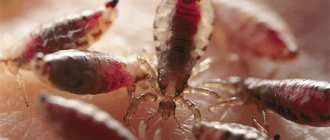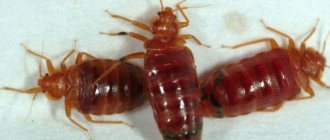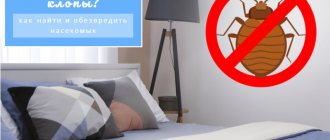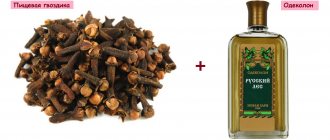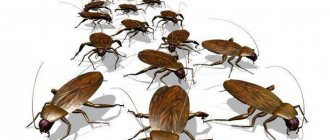The appearance of bed bugs in an apartment always causes people a lot of trouble. The bites of these bloodsuckers cause unbearable itching in humans, and in some cases, a severe allergic reaction.
In addition, bedbugs are carriers of various infections and diseases. They also contribute to damage to bedding, furniture, wallpaper, etc. The renovation done in the apartment will be hopelessly spoiled by these blood-sucking parasites.
It is worth noting that domestic bugs reproduce very actively. Therefore, if timely measures are not taken to destroy them, they will gradually populate the entire apartment. You can completely get rid of parasites only with the help of insecticidal preparations. But some odors that are unpleasant for parasites can help scare off bloodsuckers for a while and force them to look for other places of deployment.
In this article, we will take a closer look at what smells house bugs are afraid of.
Store-bought insecticides
This is the most reliable and effective remedy for home bugs. In stores you will find a lot of different drugs. They have five forms:
- Aerosols - “Clean House”, “Combat”, “Raptor”, “Raid”, “Dichlorvos”, “Antiklop”, “Carbozol”, “Perfos-P”, “Prima-U”, “Bona Forte”;
- Powders (dusts) – “Klopoveron”, “Riapan”, “Fenaxin”, “Clean House”, “Face-Double”, “Anti-bug”, “Lethal force”;
- Concentrated emulsions - “Fufanon”, “Lambda Zone”, “Xulat S25”, “Medilis Cyper”, “Get”, “Dobrokhim FOS”, “Dobrokhim Micro”, “Avalont”, “Agrant”;
- Gels – “Fas”, “Fumitox”, “Absolute”, “Global”, “Brownie”;
- Crayons – “Mashenka”, “Clean House”.
When working with chemical insecticides, it is necessary to use protective equipment - rubber gloves, goggles, a long-sleeved robe and a respirator.
You need to know this: what is the best poison against bedbugs? 15 effective remedies!
High and low temperatures
Temperature fluctuations can easily be called the first factor of inanimate nature that can be used to influence insects. Domestic bugs love warmth - the optimal temperature for them is +20 to +30 degrees. In such conditions they feel great and, with an abundance of food, begin to multiply intensively. If you want to quickly get rid of bedbugs, lower the temperature threshold to +10 or increase it to +35 degrees. This will cause the insects a feeling of severe discomfort, which will immediately affect all physiological processes (lead to their inhibition). To survive, parasites will begin to leave your home in search of more comfortable living conditions.
Advice! As practice shows, a decrease in temperature to -25 degrees can destroy the entire population living in an apartment, including adults, nymphs and egg clutches. If it's winter outside, open the windows for a few hours and let the frost do its job. The main thing is not to forget to insulate the pipes with heat-insulating materials, otherwise they will “freeze”.
What are bedbugs afraid of?
It turns out that bedbugs have a keen sense of smell and are very susceptible to strong odors. With the help of special thin hairs - sensilla, bedbugs pick up the aroma from afar...
24983
05.07.2019 12:34
Small blood-sucking parasites cause discomfort with their presence. Many residents have had to suffer from the presence of bedbugs. Their painful bites cause itching, redness of the skin, and sometimes provoke the onset of dangerous pathologies. To get rid of unwanted bugs, you must first find out what bedbugs are afraid of.
Herbs
The life activity of bedbugs can be affected by grass, or more precisely, by its smell. The fact is that during their life, bed bugs are guided only by their sense of smell, while visual pictures and sounds of this world practically do not attract them. The olfactory organs of these insects are sensilla - special hairs, at the tips of which there are nerve endings. To survive the parasites, it is enough to apply a concentrated smell, very strong and thick. Suitable for this purpose:
- Wormwood – our great-great-grandfathers used this plant to protect themselves from bedbugs. In Ancient Rus', wormwood branches were laid out under benches, beds and mattresses, and they were also placed in corners;
Scatter bunches of wormwood in corners, under carpets and sofas - bedbugs will leave your home, as they cannot stand its smell
- Tansy - in this case, not the whole plant is used, but only its inflorescences. If desired, you can prepare a concentrated tincture for spraying;
- Ledum - bedbugs cannot stand the aroma of this herb. Dry the leaves, grind them in a special mortar and scatter the resulting powder in all places where parasites may appear. Fumigating the apartment with wild rosemary leaves will have an even greater effect. Experts recommend using shoots collected in late August - early September, as they have a particularly pungent odor;
- Chamomile. What don't bedbugs like? The smell of chamomile can scare them away. It can be used as an independent remedy or mixed with other herbs;
- Calamus - it is known that what bedbugs fear most is the aroma of this marsh plant. As in other cases, it is dried, ground and scattered indoors.
Advice! Place dry herbs not only on the floor or under the beds, but also in other places - near windows, in ventilation systems, under the threshold at the front door. If a bug decides to enter your apartment, it will be immediately stopped by a very strong aroma. Also remember that almost all plants, except for the common chamomile, are poisonous in their own way. You need to work with them very carefully and do not forget to regularly ventilate the room so as not to harm its occupants.
What repels bedbugs: some folk remedies
The fear of bugs from aromatic plants has been noticed for a long time, so you can use this method to drive away the bugs for a few days or force them to hide.
We suggest you familiarize yourself with: Triatomine or kissing bugs
The disadvantages of this method are that hunger will force bed bloodsuckers to go in search of food, even if the entire apartment is covered with fragrant fresh stems and flowers, but you will definitely be able to sleep peacefully for a while.
What can repel bedbugs?
- These plants and herbs are known to everyone:
- wormwood;
- chamomile;
- tansy;
- Calamus roots.
In the warm season, you can go into nature and stock up on life-saving raw materials yourself, but if this is not possible, then a pharmacy located near your house is a good way to get hold of dry herbs.
They are easy to use: spread dry or fresh bunches of plants throughout the room in large quantities. If the products are pharmaceutical, then herbs ground into a fine fragrant powder will have a good effect on bedbugs.
By scattering a thin layer of bedbug repellent in all places where there was an accumulation of parasites, you will not have to suffer from bites for several days. (See - Photos of bedbug bites)
The disadvantages of repelling bedbugs with plant materials are that people, especially small children and the sick, cannot stay in the rooms where the treatment was carried out for a long time.
An allergy to odors is also a reason to abandon this method of influencing bed bloodsuckers.
- There is another interesting and quite pleasant way to repel bed insects - use essential oils.
What smell are bed bugs afraid of? These are the scents:
- lavender;
- rosemary;
- eucalyptus;
- star ointment Yes, bedbugs are afraid of her. They are repelled by the smell of herbs and oils.
Before going to bed, you can apply a fragrant liquid to the legs of your bed or sofa. This will be enough for a restful sleep, without painful bites, because... essential oil will effectively cope with the task.
Perfumes and essential oils
What smell repels bedbugs? You won't believe it, but these insects are afraid of the scent of perfume! This was known to representatives of the French and English aristocracy, who literally doused themselves with perfume. You can also buy the cheapest cologne (preferably with a heavy amber) and generously spray mattresses and other contaminated areas with it. Certain essential oils, such as lavender, rosemary and eucalyptus, also cause complete rejection by bedbugs. They are used locally - they lubricate surfaces in their pure form.
Bedbugs do not like strong odors, which include colognes, perfumes and essential oils, so they will quickly leave the room
What smells do bedbugs dislike?
Incredible as it may seem, bed bugs will not like being in a room that smells of perfume.
Vinegar is another effective remedy; bloodsuckers are afraid of the smell of the kitchen product. You should not expect that the parasites will leave the room for good, because even to repel them you will have to repeat the boring ritual of applying liquid to all surfaces every day. (You can read - Vinegar for bedbugs)
Vinegar or perfumes with a strong, persistent odor can be used not only to slightly calm the bedbugs that have occupied the room, but also to use the properties of the products to protect a clean apartment from the invasion of unwanted residents.
It is enough to periodically apply the liquid to all possible places where insects can enter (ventilation grilles, cracks in the walls). A strong smell will not allow parasites to smell such an alluring smell of human blood.
Tobacco. It has a pungent and unpleasant aroma for bedbugs. All other things being equal, they would rather go to visit places where there is no smell that irritates them.
Household chemicals
How to repel bedbugs? In the fight against parasites, vinegar, denatured alcohol, turpentine, kerosene, transformer oil and acetone are often used. They are also very good at repelling bedbugs. Just a few drops of any of these products applied to the surface can repel parasites for several weeks.
These drugs also include ordinary ammonia. It is added to water for washing and wet cleaning. The smell of ammonia in the air creates very uncomfortable conditions for insects.
Read more about folk remedies for bedbugs in this article.
Light
It has been proven that bedbugs are very afraid of light. Yes, this is partly true. Bed bug activity occurs between 3 and 7 am. The rest of the time they prefer to hide in dark, secluded places. If you lift the mattress in the middle of the night and turn on a bright light, the insects will start to really panic - they will scatter in different directions. It turns out that leaving the light on for several days can get rid of parasites.
Important! Unfortunately, this method is completely useless in cases where the insect nest is located in a hard-to-reach place - for example, behind baseboards.
Life depending on conditions
Insects can develop faster; to do this, it is enough to increase the ambient temperature to +28°...+35°C. Then life expectancy will be reduced from 12 to 10 months. If the temperature in the room drops to +20°C, the parasites will exist much longer – 15 months.
A decrease in air temperature to +15°C causes inhibition of parasite development. If they are exposed to even lower temperatures (0°C), they go into a special state similar to suspended animation, this phase is called diapause.
In this case, insects cease to need food, do not reproduce and do not even show the slightest activity.
Pests look like dead ones. When looking at them, many people think that death has actually occurred.
In the cold, bedbugs enter a diapause phase
At what temperature do bedbug eggs die?
The protective shell helps protect the offspring. It prevents the onset of death even when extreme temperatures are reached, when larvae and adults do not survive: at +50°C and -20°C. For parasite eggs to die under such conditions, it will take several days of continuous exposure to sub-zero temperatures.
Instant death of the embryos inside the eggs occurs when the specified limits are significantly exceeded: +60°C and -27°C.
Eggs and adults
At what temperature do bed bug larvae die?
Domestic parasites in the early stages of development die at low temperatures - from -17°C or more. However, death in such conditions occurs within a few days. The rate of destruction of larvae depends on the duration of exposure to cold. But there is still a limit to survival. So, in temperatures down to -25°C, bedbugs die in a matter of seconds.
If the temperature drops to -20°C, it will take several hours to kill the parasites.
The opposite situation is also considered - when it is hot. It will also not be possible to unequivocally answer the question at what temperature bedbugs die. The trend towards changing environmental conditions should be taken into account:
- +45°C – slow death (after 30 minutes);
- +50°C – death occurs within a few minutes;
- +55°C – instant death (in a matter of seconds).
Parasite larvae
Corrugated cardboard
Of course, insects are not afraid of it, but this old-fashioned method works 100%. Parasites love to hide in corrugated cardboard, so pieces of it can be scattered throughout the room, and then collected and burned.
To catch bedbugs in corrugated cardboard, you need to scatter pieces of it throughout the apartment, and the next morning collect them and burn them
An alternative to cardboard is a wooden stick, in which through holes are drilled and the edges are tightly closed. In ancient times, such a stick was placed in bed, and in the morning the parasites were shaken out of it.
What bedbugs are not afraid of - debunking the myths!
Now you know what house bugs are afraid of. All that remains is to find out what has no effect on them at all. What things are these parasites absolutely indifferent to?
- High-frequency air vibrations and ultrasound - they do not affect the behavior and life of bedbugs at all;
- The magnetic resonance field is absolutely useless for solving this problem;
- Salt-soda and soap-soda solutions. Folk remedies based on these solutions will not bring the desired result and will not repel bedbugs;
- High humidity has no effect on bedbugs. To kill insects, you will have to cause a real flood! Bedbugs cannot swim, so they will die as soon as their tracheas fill with water;
- Chlorine. Many people are interested in whether these blood-sucking parasites are afraid of bleach? Unfortunately, this substance is not an insecticide, so it is not capable of killing insects. As for the smell, it will only last 1-2 days.
See also: how to deal with bed bugs in an apartment
Find out which bedbug repellent is the most effective. List of the best drugs!
Plants harmful to bedbugs
Bedbugs are naturally endowed with a strong sense of smell, which is important for capturing the scent of the victim. After all, insects feed on human blood and go hunting at night, when visibility is zero. Therefore, they clearly capture other aromas, including herbs. Some types of grass have a repellent effect on them.
Herbs that bedbugs fear:
- chamomile;
- wild rosemary;
- tansy;
- sagebrush;
- valerian;
- celandine.
Each is described in more detail below.
Ledum
This evergreen plant grows in marshy areas. The biochemical composition contains essential oils, which have a depressing effect on parasites. Under their influence they fall asleep and die. Young shoots are used as an insecticidal agent.
To treat the room, the grass is first dried and ground into powder. Scatter it over contaminated areas or fumigate the surrounding area with it by burning it. A decoction of wild rosemary helps relieve itching caused by bedbug bites. It is also used to spray surfaces against parasites.
The plant is poisonous, so when collecting it is recommended to wear protective gloves and a respirator over your nose.
Chamomile
There are several varieties of chamomile, but only Dalmatian chamomile has an intoxicating effect on bedbugs. This is due to the presence of pyrethrins in it - substances that negatively affect the sense of smell of insects. While grass is absolutely harmless to humans.
As a last resort, you can use pharmaceutical chamomile. It is also poisonous, but to a lesser extent.
Mode of application:
- Only blossoming flower baskets are collected and dried. Then grind it to a powder using a coffee grinder.
- The resulting powder is scattered in places where bedbugs accumulate: under the sofa and mattress, behind baseboards, in cracks, pillowcases.
- Leave the product for 5-7 days.
Having smelled the chamomile aroma, the parasites immediately leave their shelter. Some die on the spot, as the grass has a nerve-paralytic effect. All that remains is to sweep them away and throw them away.
The only disadvantage of chamomile is the rapid disintegration of the insecticidal components in the composition under direct exposure to sunlight.
Sagebrush
The tart wormwood aroma in the apartment quickly eliminates the presence of blood-sucking parasites. Place bunches of fresh grass in the corners. But this is until the insects go hungry. Then nothing will stop them, not even the bitter smell of wormwood.
This product will not be able to kill bedbugs, especially their eggs. It is used more as prevention and temporary protection. It is recommended to place the grass directly under the mattress or sofa, in close proximity to the sleeping person. Then the bugs will not bite at night. You need to change the grass to fresh one every 3 days.
Disadvantages of using wormwood:
- The bitter aroma stays in the air for no longer than 2-3 days, then the raw materials need to be replaced.
- Severely hungry, bedbugs ignore the pungent aroma and return.
- Does not affect the volume of bedbug populations and their reproduction.
- The intoxicating smell may not be to the liking of the owners, causing dizziness.
To extend the period of the repellent effect, make a decoction or infusion, which is used at any time of the year. Another effective option is alcohol tincture. One liter is enough for the full treatment of one large object, with a detrimental effect on parasites of a week.
A similar product is made based on pure alcohol, which is taken 1:1 in relation to the grass. Leave in a dark and cool place for about a month. The paradox is that during this time the population of bedbugs in the house will increase significantly. Therefore, this option has little prospects.
In this regard, the decoction is more productive and cheaper, since the raw materials can be prepared independently in the summer season. Surfaces can be treated with it repeatedly using a sprayer. Therefore the consumption is small.
Valerian
Bedbugs cannot stand the pungent odor of another herb – valerian. The plant is rich in essential oils, it contains up to 5%. Smelling an irritating aroma, they crawl outside, where they are collected with a vacuum cleaner or washed off with a wet cloth.
Decoctions, water or alcohol infusions are prepared from fresh herbal raw materials, or they are laid out around the room in a fresh state. You can buy a ready-made alcohol tincture at the pharmacy. Apply liquid compounds to possible insect nesting areas. Use with caution if there is a cat in the house.
Celandine
An herb similar to valerian in its action principle, it dispels bloodsuckers with a pungent odor. The tincture shows the greatest effectiveness.
Prepare as follows:
- Chop freshly picked celandine leaves with a sharp knife.
- Measure out 190-200 grams and fill with water (10 liters).
- Leave for 2-3 days.
- After the allotted time, add 60 g of laundry soap shavings. Stir well until dissolved.
The resulting liquid is used to treat the parasites' locations and possible routes of movement.
Tansy
Tansy, which has a very pungent odor, helps get rid of bedbugs. It has a terrifying effect on blood-sucking insects, expelling them from their homes. However, it will not be possible to completely destroy them in this way.
If bedbugs have been living for a long time and have acquired large nests, then it is recommended to make a herbal, highly concentrated decoction. Pour it directly onto parasitic clusters. Bed bugs die only when the infusion gets ingested directly.
When spraying the herbal composition indoors and on surfaces, the protection lasts 4-5 days. After which the smell disappears, allowing pests free access to their previous locations. Tansy has no effect on laid bedbug eggs.
To prevent harmful invasions, put the grass in the room and leave it until it dries. Tansy is one of the toxic plants, so children and pets should not come into contact with it.
